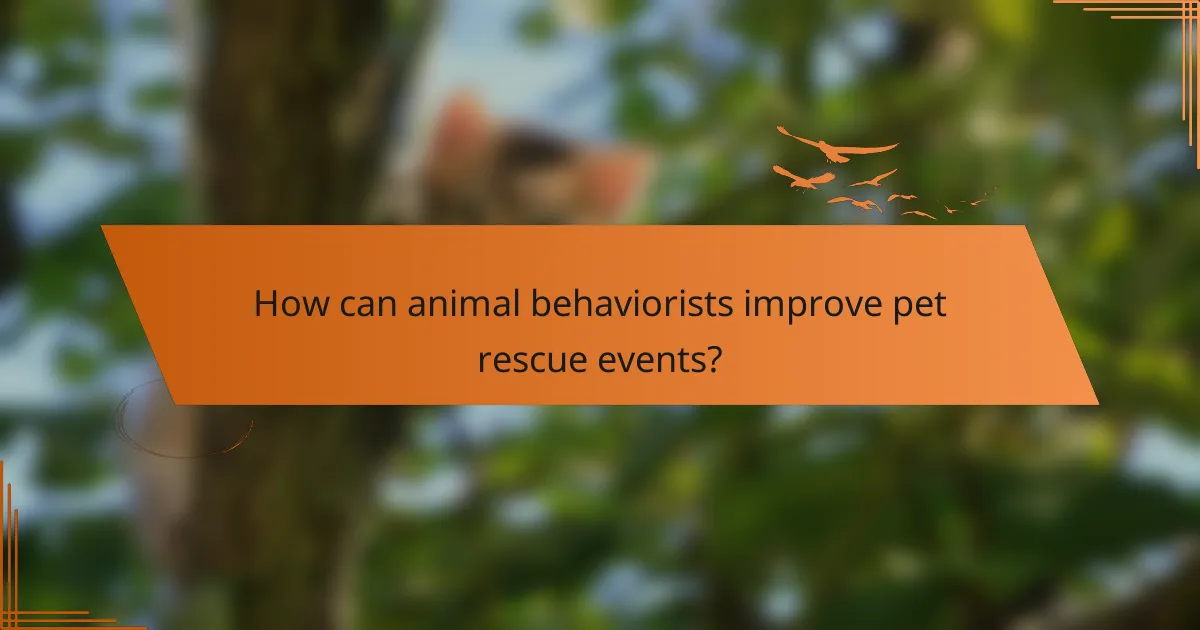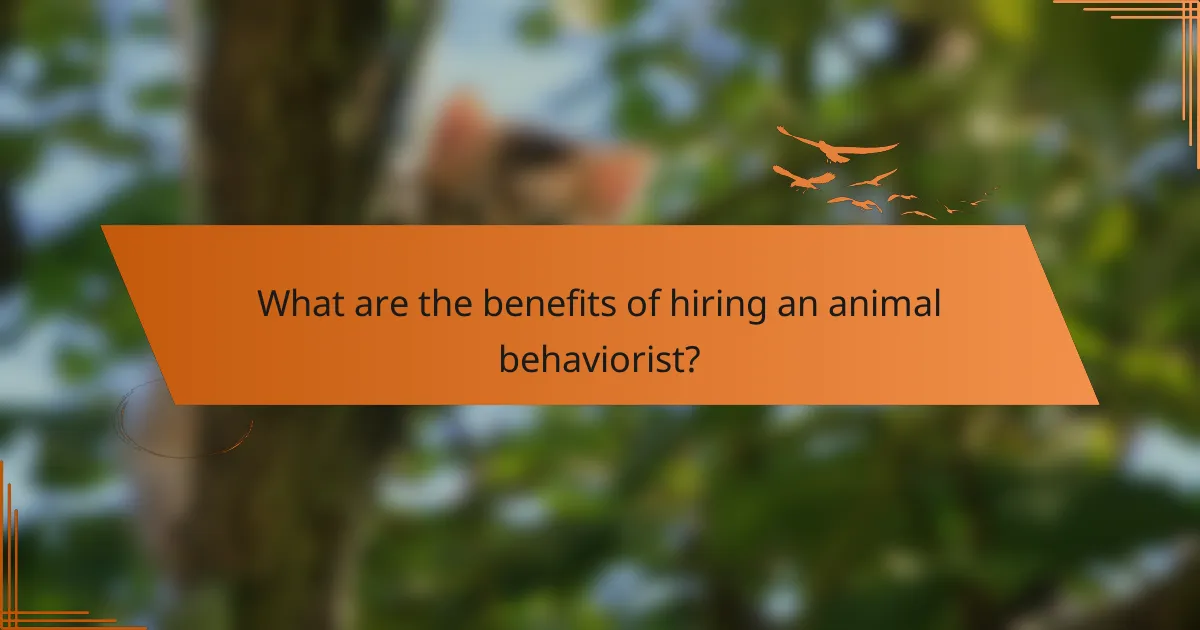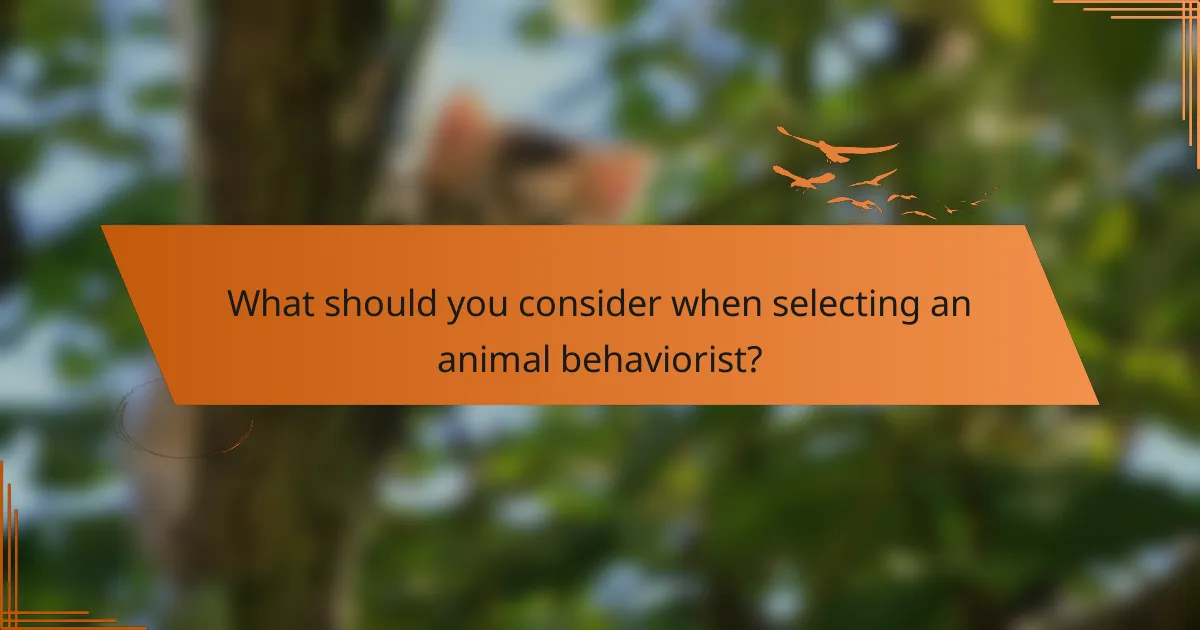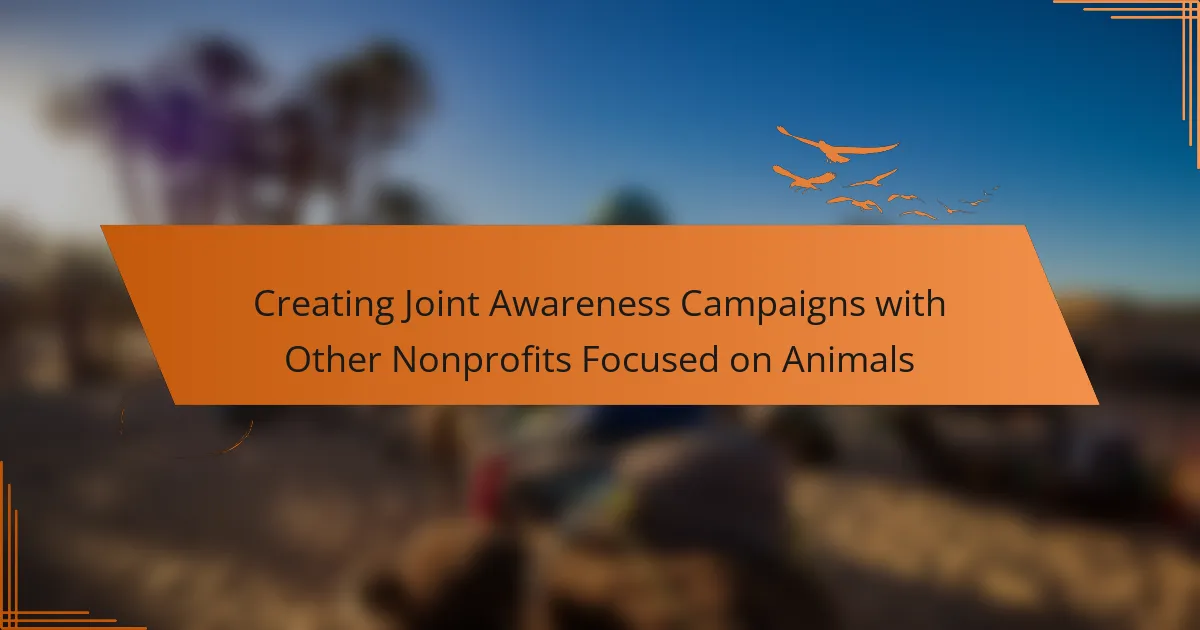Engaging animal behaviorists at pet rescue events can greatly improve the overall experience for both animals and potential adopters. Their expertise in animal behavior not only facilitates better socialization and training methods but also fosters a more interactive and positive environment, ultimately leading to higher adoption rates. By carefully selecting a qualified behaviorist, event organizers can ensure a successful and memorable experience for all involved.

How can animal behaviorists improve pet rescue events?
Animal behaviorists can significantly enhance pet rescue events by providing expertise in animal behavior, which leads to better socialization, increased adoption rates, and thorough behavioral assessments. Their insights help create a more engaging and effective environment for both pets and potential adopters.
Enhanced animal socialization
Animal behaviorists facilitate enhanced socialization for pets at rescue events by implementing structured interactions with people and other animals. They can guide volunteers on how to introduce pets to potential adopters in a way that reduces stress and encourages positive behavior.
For instance, behaviorists might recommend specific activities, such as group play sessions or training demonstrations, that showcase a pet’s personality and adaptability. This not only makes the pets more appealing but also helps them build confidence in a social setting.
Increased adoption rates
By improving the overall experience for both pets and visitors, animal behaviorists can help increase adoption rates at rescue events. Their strategies often include creating a welcoming atmosphere, where pets are calm and approachable, which encourages potential adopters to engage.
For example, behaviorists may suggest using calming techniques or enrichment activities to keep pets relaxed, making them more likely to connect with visitors. Events that incorporate these practices often see a noticeable uptick in successful adoptions.
Behavioral assessments for pets
Behavioral assessments conducted by animal behaviorists provide valuable insights into each pet’s temperament and needs. These assessments help identify any behavioral issues that may need addressing before adoption, ensuring a better match between pets and families.
During rescue events, behaviorists can perform quick evaluations to inform potential adopters about a pet’s suitability for their lifestyle. This proactive approach not only aids in making informed decisions but also fosters a higher rate of successful placements, as adopters are more aware of what to expect.

What are the benefits of hiring an animal behaviorist?
Hiring an animal behaviorist can significantly enhance the experience of pet rescue events by providing expert insights into animal behavior, improving training methods, and fostering better engagement with attendees. Their specialized knowledge helps create a more positive environment for both pets and potential adopters.
Expertise in animal psychology
Animal behaviorists possess a deep understanding of animal psychology, which allows them to assess and interpret the behaviors of pets in rescue situations. This expertise is crucial for identifying stress signals, anxiety triggers, and behavioral issues that may arise during events.
By applying their knowledge, behaviorists can offer tailored advice to volunteers and staff, ensuring that interactions between animals and visitors are safe and positive. This can lead to a higher likelihood of successful adoptions.
Customized training programs
Behaviorists can design customized training programs that cater to the specific needs of the animals at rescue events. These programs may include basic obedience training, socialization techniques, and strategies to reduce anxiety in new environments.
Implementing these training methods can help animals present themselves better to potential adopters, making them more appealing and increasing the chances of finding a forever home.
Improved event engagement
Engaging an animal behaviorist can enhance overall event engagement by providing interactive demonstrations and educational sessions for attendees. These activities can help visitors understand animal behavior, fostering a deeper connection with the pets available for adoption.
Additionally, behaviorists can train volunteers to effectively communicate with the public, ensuring that they can answer questions and address concerns about pet care and behavior. This creates a more welcoming atmosphere, encouraging more people to consider adoption.

What should you consider when selecting an animal behaviorist?
Selecting an animal behaviorist for your pet rescue event requires careful consideration of their qualifications, experience, and alignment with your event goals. A well-chosen behaviorist can enhance the experience for both animals and attendees, ensuring a successful and engaging event.
Qualifications and certifications
When evaluating an animal behaviorist, check their qualifications and certifications. Look for credentials from recognized organizations such as the Animal Behavior Society or the International Association of Animal Behavior Consultants. These certifications indicate a solid foundation in animal behavior principles and practices.
Additionally, consider their ongoing education and training in the field. A behaviorist who regularly updates their knowledge through workshops or conferences is likely to be more effective in applying current best practices.
Experience with rescue organizations
Experience with rescue organizations is crucial for an animal behaviorist. They should have a background working with various animal species, particularly those commonly found in shelters, such as dogs and cats. This experience helps them understand the unique challenges faced by rescue animals.
Ask for references or case studies from previous collaborations with rescue events. A behaviorist who has successfully contributed to similar events can provide insights and strategies tailored to your specific needs.
Compatibility with event goals
Ensure the behaviorist’s approach aligns with your event goals. If your focus is on adoption, the behaviorist should be skilled in creating positive interactions between potential adopters and animals. They should be able to facilitate meet-and-greets that highlight the animals’ best traits.
Discuss your event’s objectives with the behaviorist to gauge their understanding and willingness to adapt their methods. A good fit will enhance the overall experience and help achieve your rescue goals effectively.

How can you integrate animal behaviorists into your event planning?
Integrating animal behaviorists into your event planning can significantly enhance the experience for both pets and attendees. These professionals can provide valuable insights and practical activities that promote better understanding and care for animals during rescue events.
Workshops and demonstrations
Hosting workshops and demonstrations led by animal behaviorists allows attendees to learn about animal behavior and training techniques firsthand. These sessions can cover topics such as basic obedience, socialization strategies, and understanding pet body language. Aim for interactive formats where participants can practice skills with animals present, enhancing engagement and retention.
Consider scheduling multiple workshops throughout the event to cater to different skill levels. For example, beginner sessions could focus on leash training, while advanced workshops might delve into behavioral modification techniques.
Consultations for volunteers
Offering consultations for volunteers with animal behaviorists can improve their effectiveness in handling and caring for pets at the event. These consultations can provide tailored advice on managing stress in animals, recognizing signs of anxiety, and implementing positive reinforcement techniques.
Set aside time for one-on-one or small group consultations, ensuring volunteers feel confident in their roles. Providing written resources or quick reference guides can also help reinforce the strategies discussed during these sessions.
Interactive sessions for attendees
Interactive sessions for attendees can create memorable experiences while educating them about animal welfare. Activities such as Q&A panels, live demonstrations, or hands-on training sessions with animals can engage the audience and foster a deeper connection with the pets available for adoption.
Encourage attendees to participate in activities like agility courses or scent work, which can showcase the capabilities of rescue animals. This not only entertains but also highlights the importance of training and socialization in helping pets find forever homes.

What are effective strategies for promoting pet rescue events?
Effective strategies for promoting pet rescue events include leveraging social media, forming partnerships with local businesses, and engaging in community outreach programs. These methods can significantly increase visibility and participation, ultimately benefiting the animals in need.
Social media campaigns
Social media campaigns are a powerful tool for promoting pet rescue events. Platforms like Facebook, Instagram, and Twitter allow organizations to reach a wide audience quickly, sharing engaging content such as photos, videos, and success stories of rescued pets.
To maximize impact, create a content calendar leading up to the event, featuring countdown posts, behind-the-scenes looks, and testimonials from adopters. Use targeted ads to reach specific demographics, ensuring your message resonates with potential attendees.
Partnerships with local businesses
Forming partnerships with local businesses can enhance the visibility of pet rescue events. Collaborate with pet supply stores, veterinary clinics, and cafes to promote the event through their channels, such as newsletters, in-store posters, or social media.
Consider offering incentives for businesses, like co-hosting the event or providing promotional materials. This mutual support can create a sense of community and encourage more people to attend, benefiting both the rescue organization and the local business.
Community outreach programs
Community outreach programs are essential for raising awareness about pet rescue events. Engaging with local schools, community centers, and clubs can help spread the word and attract diverse audiences.
Organize educational workshops or presentations about responsible pet ownership and the importance of adoption. Providing hands-on experiences, such as meet-and-greets with adoptable pets, can foster a deeper connection and encourage participation in the event.

How do animal behaviorists contribute to pet welfare?
Animal behaviorists play a crucial role in enhancing pet welfare by applying their expertise to improve the lives of animals in shelters. They develop strategies to address behavioral issues, which can lead to better adoption outcomes and overall well-being for pets.
Reducing stress in shelter animals
Reducing stress in shelter animals is essential for their health and adoptability. Animal behaviorists implement techniques such as environmental enrichment, socialization, and behavioral modification to create a more calming atmosphere in shelters.
For instance, introducing toys, safe spaces, and regular interaction with humans can significantly lower anxiety levels in animals. Behaviorists often recommend structured routines that include playtime and quiet periods to help animals feel more secure.
To effectively reduce stress, shelters should consider the individual needs of each animal. Regular assessments and adjustments to care plans can ensure that the specific behavioral and emotional needs of each pet are met, ultimately leading to a more positive experience for both the animals and potential adopters.



